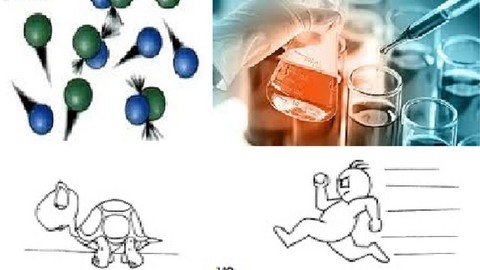
MP4 | Video: h264, 1280x720 | Audio: AAC, 44.1 KHz
Language: English | Size: 1.88 GB | Duration: 3h 32m
Rates of Rection
What you'll learn
The students will get a wide picture of rate of reaction
The students will learn about slow and fast reactions.
The students will have a deep knowledge about the reaction parameters.
The students will know about the importance of fast reactions in daily life.
Requirements
The child should have a clear concepts of types of reactions.
Description
A chemical change involves changing reactants to products. A balanced equation is an essential quantitative tool for calculating product yields from reactant amounts, but it tells us nothing about three dynamic aspects of the reaction, which are essential to understanding chemical change. For any chemical reaction, chemists try to find out
1. How fast is the reaction proceeding at a given moment?
2. What will be the reactant and product concentrations when the reaction is complete?
3. Will the reaction proceed by itself and release energy, or will it require energy to proceed?
This lecture addresses the first of these questions and focuses on the field of kinetics, which deals with the speed of a reaction and its mechanism, the stepwise changes that reactants undergo in their conversion to products.
The extent to which a reaction will proceed can be determined from chemical equilibrium whereas the feasibility of a chemical reaction can be predicted by thermodynamics (DG < 0). The knowledge of free energy change of a reaction however gives us no idea about the rate and the factors controlling the rate of a reaction.
For example,
Why do some reactions occur slowly while others seem to take place
instantaneously?
How does chemist's measure, compare and express the rates at which chemical reactions occur?
Can chemists predict and control the rate of a chemical reaction?
How quickly a chemical reaction occurs is a crucial factor in how the reaction affects its surroundings. Therefore, knowing the rate of a chemical reaction is integral to understanding the reaction. For example,
How quickly a medicine acts or blood clots can make the difference between life and death.
How long it takes for cement to harden or polyethylene to form can make the difference between profit and loss.
All these questions can be answered by the branch of chemistry known as
Chemical kinetics.
Who this course is for
For the Beginners and students of twelfth standard.
https://www.udemy.com/course/learn-chemical-kinetics
https://hot4share.com/xldh17v6rdwy/tnqj1.Learn.Chemical.Kinetics.part1.rar.html
https://hot4share.com/jahiqpije4c6/tnqj1.Learn.Chemical.Kinetics.part2.rar.html

https://uploadgig.com/file/download/ff941070f54e8014/tnqj1.Learn.Chemical.Kinetics.part1.rar
https://uploadgig.com/file/download/ffFD17fd0831aa40/tnqj1.Learn.Chemical.Kinetics.part2.rar

https://rapidgator.net/file/f7a4d991c0e09afcfce5bb4a2553e5d9/tnqj1.Learn.Chemical.Kinetics.part1.rar.html
https://rapidgator.net/file/b1cf8995183aba48b5657e7f6ea5a5c7/tnqj1.Learn.Chemical.Kinetics.part2.rar.html

https://nitro.download/view/B519CCF67B5D0E7/tnqj1.Learn.Chemical.Kinetics.part1.rar
https://nitro.download/view/82E5E34F96F4403/tnqj1.Learn.Chemical.Kinetics.part2.rar
Links are Interchangeable - No Password - Single Extraction
